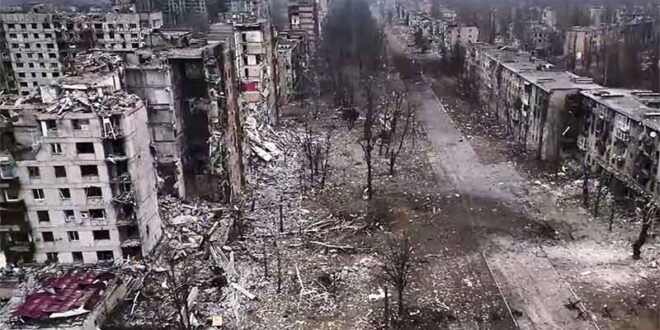War always commands its own appeal. It has its own frazzled laurels, the calling of its own worn poets tenured in propaganda. In battle, the poets keep writing, and keep glorifying. The chattering diplomats are kept in the cooler, biding their time. The soldiers die, as do civilians. The politicians are permitted to behave badly.
With Ukraine looking desperately bloodied at the hands of their Russian counterparts, the horizon of the conflict had seemingly shrunk of late. Fatigue and desperation had set in. Washington seemed more interested in sending such musically illiterate types as the Secretary of State Antony Blinken to Kyiv for moral cuddling rather than suitably murderous military hardware.
Russian President Vladimir Putin, mindful of the losses inflicted on his own side in the conflict, thought it opportune to spring the question of peace talks. On June 14, while speaking with members of the Russian Foreign Ministry, he floated the idea that Russia would cease combat operations “immediately” if Ukraine abandoned any aspirations of joining NATO and withdrew its troops from the regions of Donetsk, Luhansk, Kherson and Zaporizhzhia.
Rather than refrigerate the conflict into its previous frozen phase, Putin went further. It would end provided that Kyiv accepted Moscow’s sovereign control over the four regions as “new territorial realities”. Russian-speaking citizens in Ukraine would also be afforded protections; sanctions imposed by Western states would be lifted. “Today,” he stated, “we have put forward another concrete, genuine peace proposal. If Kyiv and Western capitals reject it as they have in the past, they will bear political and moral responsibility of the ‘continuation of the bloodshed.’”
He further added that, as soon as Ukraine began withdrawing its military personnel from Donbas and Novorossiya, with an undertaking not to join NATO, “the Russian Federation will cease fire and be ready for negotiations. I don’t think it will take long.”
Length and duration, however, remain the signal attributes of this murderous gambit. Ukraine’s defeat and humbling is unacceptable for the armchair strategists in the US imperium, along with their various satellites. NATO’s obsessive expansion cannot be thwarted, nor can the projection of Washington’s influence eastwards from Europe. And as for the defence contractors and companies keen to make a killing on the killings, they must also be considered.
This was unpardonable for the interests of the Biden administration. The Washington War Gaming Set must continue. Empires need their fill, their sullied pound of flesh. Preponderance of power comes in various forms: direct assault against adversaries (potentially unpopular for the voters), proxy enlistment, or the one degree removed sponsorship of a national state or entity as a convenient hitman. Ukraine, in this sense, has become the latter, a repurposed, tragic henchman for US interests, shedding blood in patriotic gore.
In keeping with that gore, US President Joe Biden, in announcing a funding package for Ukraine from the G7 group, promised that “democracies can deliver”. The amount on the ledger: $US50 billion. “We are putting our money to work for Ukraine, and giving another reminder to Putin that we are not backing down.” That particular amount is derived from frozen Russian assets outside Russian territory, most of it from the Russian Central Bank amounting to US$280 billion. The circumstances of such freezing will, in future, be the subject of numerous dissertations and legal challenges, but that very fact suggests that Ukraine’s allies are tiring from drawing from their own budgets. We support you, but we also hate to see the money of our taxpayers continually splurged on the enterprise.
Biden’s remarks from the Hotel Masseria San Domenico in Fasano have a haunting quality of repetition when it comes to US support for doomed causes and misguided goals. The fig leaf, when offered, can be withdrawn at any given movement: South Vietnam, doomed to conquest at the hands of North Vietnam; Afghanistan, almost inevitably destined to be recaptured by the Taliban; Kurds the Marsh Arabs, pet projects for US strategists encouraged to revolt only to be slaughtered in betrayal.
Thus goes Biden: “A lasting peace for Ukraine must be underwritten by Ukraine’s own ability to defend itself now and to deter future aggression anytime […] in the future,” Biden explains, drawing from the echo of Vietnamisation and any such exultation of an indigenous cause against a wicked enemy. The idea here: strengthen Ukrainian defence and deterrence while not sending US troops. In other words, we pay you to die.
The NATO disease, poxy and draining, rears its head. Weapons and ammunition are to be provided to Ukraine along with the expansion of “intelligence-sharing” and training while “enhancing interoperability between our militaries in line with NATO standards”. Money is to be put into Ukraine’s own defence industry so that they can duly “supply their own weapons and munitions”. In the floral bouquet, a cautionary note is appended. “In terms of longer range of weapons into the interior of Russia we are not changing our positions.” Killing is always a matter of quantum, and calculation. The note for Kyiv is clear: use the weapons but do so carefully.
As for the logistics of finance, US national security adviser Jake Sullivan is already voicing concerns about the complexity of the funding venture. “The simple proposition is we got to put these assets to work. The complex proposition is how you do that specifically.”
While Putin has turned his nose up at the UN Charter in its solemn affirmation of the sovereignty of states, Washington has taken its own wrecking ball to the text. It has meddled, fiddled and tampered with the internal affairs of states while accusing Russia of the very same thing. Spiteful of history and its bitter lessons, it has employed such saboteurs as former Assistant Secretary of State Victoria Nuland to undertake such tasks, poking the Russian Bear while courting and seducing the Ukrainian establishment. The horror is evident for all to see, and unlikely to halt.
 Eurasia Press & News
Eurasia Press & News




